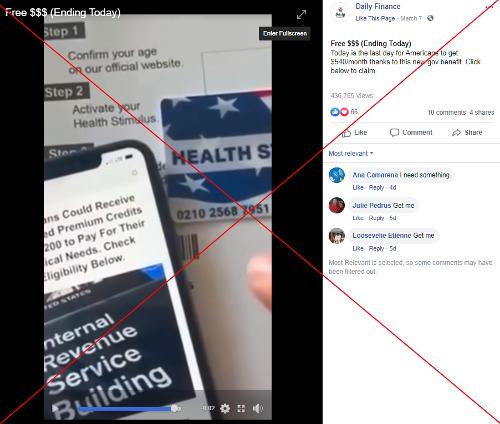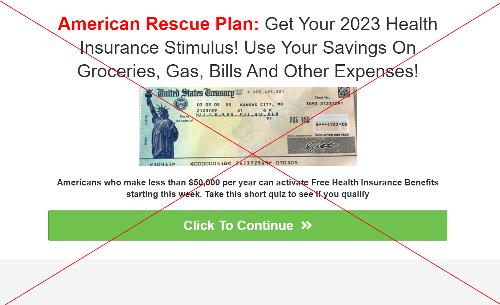
Facebook ads falsely claim to offer US government aid
- This article is more than two years old.
- Published on March 15, 2023 at 17:52
- 3 min read
- By AFP USA
"Today is the last day for Americans to get $540/month thanks to this new gov benefit. Click below to claim," says a March 7, 2023 Facebook post promoting a short video with hundreds of thousands of views.
The linked webpage references the American Rescue Plan (ARP), a stimulus bill that Congress passed in 2021 to offset the effects of the coronavirus pandemic.

The post is part of a series of identical advertisements on Facebook that link to websites claiming to offer hundreds of dollars in "health credits" and "free" stimulus payments in exchange for taking a quiz.
The ARP included subsidies that lowered health care costs, resulting in premium savings of around $800 per year for 13 million qualifying Americans, according to the latest numbers from the White House. The Inflation Reduction Act, which President Joe Biden signed in August 2022, extended some of those benefits.
But the IRS and White House websites say nothing of a new relief program -- and the ARP in its original form has expired.
The IRS did offer some tax credits for qualifying health care expenses as part of the federal government's emergency pandemic response. The program spanned April to September 2021 and benefitted households that met certain criteria.
"I think there has been some discussion of maybe extending that but it hasn't happened yet," said Eric Smith, an IRS spokesman, on March 14.
He said claims of new IRS "health credits" are false -- and that if tax benefits are extended, it "won't involve you filing a direct claim with the IRS."
'Solicitation of insurance'
A closer look at the webpage linked in the posts reveals a disclosure that the advertised benefits are not government aid.
"The purpose of this site is the solicitation of insurance," the page says. "Medicare supplement insurance plans are not connected with or endorsed by the US government or the federal Medicare program."
Medicare Advantage plans, which are provided by private companies, are frequently the subject of deceptive ads on social media. AFP previously reported how some such promotions are linked to big insurance firms.
Mainack Mondal, an assistant professor of computer science, usable security and privacy at the Indian Institute of Technology Kharagpur, told AFP in a March 14 email that the URL inconsistencies in the ads shared online are the first sign that social media users should be "worried about the veracity of the post."
The text of the ad claims to offer "new (government) benefits," he said -- but the link goes to "givebackhotline.com" instead of a ".gov" website.


The website also displays the logo of the Better Business Bureau (BBB), a nonprofit organization that fields consumer complaints and monitors businesses' behavior, as supposed proof of accreditation.
But Melanie McGovern, director of public relations for the International Association of Better Business, told AFP this is false, citing a webpage about "BBB imposters."
She also said in a March 14 email that there is "no government source to back up the claims" in the posts.
'Telltale signs'
The US Federal Trade Commission (FTC) warned in 2021 that the ARP would give rise to health care scams online.
Americans should visit "a government agency's website or contact the agency directly to confirm the accuracy of any information that they see on social media regarding government programs," said Jay Mayfield, senior public affairs specialist at the FTC.
Kathy Stokes, director of fraud prevention programs at AARP, also advised caution when interacting with such posts.
"Anytime you see a post on social media about 'a new government benefit,' assume it is fraud," she told AFP in a March 13 email. "Don't engage with the post by taking a short survey or clicking on a link."
Stokes recommended checking trusted news sites to see if any "major new government benefit" was recently announced. She said other "telltale signs" of a scam include "an 'act now' urgency" and errors or typos.
Mondal of the Indian Institute of Technology Kharagpur concurred, saying the lack of "internet footprint" and the informal language of the ads are cause for concern. He said interacting with the posts could lead to fraud or the unnecessary divulgence of users' personal information.
AFP has previously debunked other posts claiming to offer government relief here, here and here.
Copyright © AFP 2017-2026. Any commercial use of this content requires a subscription. Click here to find out more.
Is there content that you would like AFP to fact-check? Get in touch.
Contact us
